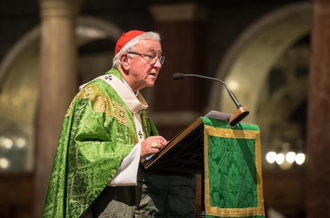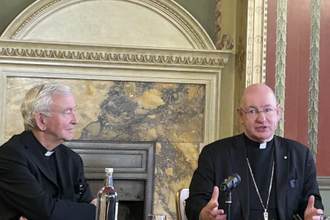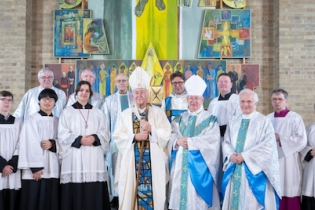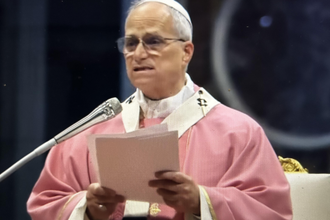Text: Cardinal Vincent Nichols at International Mass

Source: Archbishops House
HE Cardinal Vincent Nichols, Archbishop of Westminster, gave the following homily during the International Mass at Westminster Cathedral on Sunday, 24 September 2023:
1. Let us begin with the First Reading.
What an immense gift - the reassurance and consolation it proclaims:
God is not like us!
In God we find none of our characteristics as fallen women and men:
"My thoughts are not your thoughts.
My ways are not your ways".
Thank God for that!
We can think of the restrictions, frustrations and self-centeredness, selfishness, laziness, malice, envy, greed, that are part of our make-up.
In contrast, God does not calculate profit and loss; advantage or disadvantage. God's love is entirely generous, a limitless flow of love, not counting the cost. (cf Psalm 36:5). Thus, we say: "Thanks be to God".
This is why we cling to God at every moment we can, and are lifted up and consoled.
2. This was the perspective offered by Pope Francis yesterday, 23rd September, in Marseille. He was speaking about the flow of migrants to Europe. He gave a glimpse of God's ways, which are not ours. He urged European governments to welcome migrants instead of seeing them as invaders, saying:
"Those who risk their lives at sea do not invade, they look for welcome"
"The risk we face" he continued "is turning the Mediterranean, the mare nostrum, from the cradle of civilization into the mare mortuum, the graveyard of dignity."
"My ways are not your ways", says the Lord. Lord, have mercy upon us.
3. Now let us turn to the Gospel.
What a parable!
Who cannot have sympathy for those who have worked all day and yet received only the same wage as the latecomers?!
It is just not fair! In the same way, we feel sympathy for the elder brother of the Prodigal Son who has to cope with his tearaway younger brother.
But let us look at this parable more closely, in two ways.
a. This was an age of casual, day-by-day labour - not at all unknown today despite the best efforts of the labour movements.
Those still in the marketplace at the 6th, 9th and 11th hour, have simply not found work, nor having been given an opportunity to work. Without work there would be no money for food and consequently they would have had to go home empty-handed and their children go hungry.
I am told that one denarius was a kind of minimum daily wage, enough only to keep a poor family alive.
So, the master of the vineyard recognised the need and does what he can to keep families alive - he was acting out of a sense of social responsibility, showing charity towards the needy.
What a shining example to us of how to respond to those in need!
Thank God that so many people do this.
b. Here is another perspective for you.
Think of the denarius as the gift of salvation.
We are made to know God, love God and serve God and to be happy forever in God's presence.
This gift - this denarius - can come at different points in life, in different circumstances. It comes not in the pattern of the minimal rules of justice but in the "limitless flow of love" which is the manner of our saving God.
We rejoice with all who receive this denarius, be it early or late, whether with a generosity of response for a lifetime, or at the last minute!
This is our joy and indeed our ministry as priests.
4. A final word of thanks to all the chaplains who are present here this evening. Thank you for your ministry to your people.
Yesterday, we went as a diocese on a pilgrimage to Walsingham. Many who came were from your different chaplaincies and ethnic groups. They represented all different parts of the world
Some came from Europe, from Hungary, and Slovakia;
From the countries of Africa - from the Republic of the Congo and Zimbabwe;
From regions of India;
From the Philippines;
From Vietnam and China.
They came from so many different places.
All of us together knelt in prayer before the Blessed Sacrament. Before us was the great archway of the medieval monastery beside the excavated remains of the Holy House, which dates back to the 11th century.
It stuck me forcibly then, and it does so again, today, here in the Cathedral, that no matter where we come from, here we all become part of the same story of the faith in this land with its glories and great failures, its divisions as well as its courageous leadership and saints.
All of us together contribute to this unfolding history, a story that is far from finished. Together we praise God and serve Him, today and always.
Amen.


















